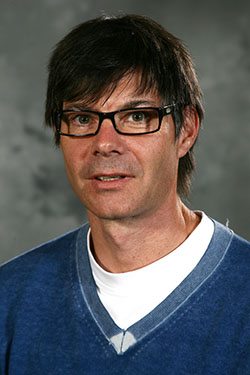Mastering the Discipline of Fusing Disciplines
 “What’s your major?”
“What’s your major?”
It’s the quintessential college query, although perhaps not so much for Dr. Will McConnell or his students. Dr. McConnell, chair of the Interdisciplinary Studies program in the College of Liberal Arts, is a champion of re-definition. Off-the-shelf just isn’t the way his department rolls.
“The most satisfying aspect of my role as department chair is the ability to work directly with students, one-on-one, to create a curriculum that identifies a student’s professional goals, and then design a course of study to maximize that individual’s potential,” Dr. McConnell says. The result is a singular undergraduate experience, tailored to each student who enters the program.
His approach enlists best practices to build student awareness of the power of developing academic rigor across multiple disciplines. Experiential learning, applied theory, and highly-developed multimedia communication techniques – all are the order of the day. “I routinely combine multiple research approaches and disciplinary fields as a way to shift perspectives on current behavior — and the impact of our behavior on human and other natural environments,” he says.
While Dr. McConnell views his mission as helping students find and forge connections among disparate disciplines, his own academic playing field is quite well-defined: the planet itself. “My primary research area is in building environmental sustainability awareness, and my primary interest is in re-theorizing and rebuilding human relation(s) to ocean environments,” he says. “I’ve produced and incorporated research across disciplines and in multiple fields within disciplines, ranging from the science of global warming, to uncovering attitude/behavior gaps in achieving short and long term sustainability, to international law and treaties governing research into ocean sustainability issues.”
As a case in point, he recently designed a course called “SCUBA and the Southern California Biosphere,” through which students obtained their open water diving credentials as they learned about the ocean from multiple disciplines and research perspectives.
Those perspectives could scarcely be more diverse: from the science of designing marine protected areas, marine biology and biodiversity, to the psychology of consumer behavior, marketing and the greening of businesses, to higher education and the integration of environmental sustainability paradigms, to international approaches to ocean protection and conservation. Dr. McConnell has presented his research to international gatherings of scientists, marketing academics and professionals, political science and government professionals, and educational practitioners.
Within the department, students and professors continue to collaborate in new and compelling ways. “Among students, this keeps motivation levels high, since it enables them to receive, and provide, constant feedback on what’s working and what may not be, so we can tailor the program to and for multiple learning needs and styles,” he says.
But back to that “what’s your major?” question. Perhaps the answer isn’t actually a what but a how. Says Dr. McConnell: “We work closely with individual students to discern their best learning styles, and adapt the curriculum with and for each student’s needs and life goals.”
Viewed in that way, you might think of Interdisciplinary Studies as specializing in a sort of “guided DIY,” which sounds about right for the free thinkers who call the department home.